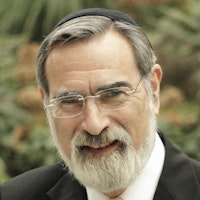“The greatest single antidote to violence is conversation, speaking our fears, listening to the fears of others, and in that sharing of vulnerabilities, discovering a genesis of hope.”
“The greatest single antidote to violence is conversation, speaking our fears, listening to the fears of others, and in that sharing of vulnerabilities, discovering a genesis of hope.”
Jonathan Sacks

The Genesis of Hope
Topic: Justice, Vision, & Leadership
The greatest single antidote to violence is conversation, speaking our fears, listening to the fears of others, and in that sharing of vulnerabilities, discovering a genesis of hope.
Jonathan Henry Sacks, Baron Sacks, was born on March 8, 1948, in Lambeth, London. He became a notable British Orthodox rabbi, philosopher, theologian, author, and politician. From 1991 to 2013, he served as the Chief Rabbi of the United Hebrew Congregations of the Commonwealth, playing a pivotal role in guiding and representing Jewish communities across the region.
Beyond his leadership in the Jewish community, Sacks was deeply passionate about character education, morality, and the importance of family. He frequently emphasized the role of ethical teachings in forming well-rounded individuals and believed in the necessity of strong family bonds for a stable society. An accomplished author, his books often explored the intersections of faith, morality, and contemporary challenges, aiming to make religious insights relevant to a wide audience. These works not only resonated within religious circles but also found acclaim in academic and political spheres due to their timely and profound insights.
Sacks passed away on November 7, 2020, in London. His legacy, marked by interfaith dialogue, advocacy for character education, and a steadfast commitment to the Jewish community, continues to inspire many. He is survived by his wife, Elaine Taylor Sacks, whom he married in 1970.
The Dignity of Difference
Tippett, Krista [Krista Tippett, On Being with Krista Tippett, Remembering Rabbi Lord Jonathan Sacks].

Jonathan Sacks
Resources
- The power to create in the face of division, The Pause, The On Being Project
- Remembering Rabbi Lord Jonathan Sacks, On Being with Krista Tippett (Part of the Civil Conversations Project)
- Jonathan Sacks, The Office of Rabbi Sacks
- How we can face the future without fear, together | Rabbi Lord Jonathan Sacks, TED
- The world lost a moral voice, but Rabbi Lord Jonathan Sacks’ wisdom lives on By the Deseret News Editorial Board Nov 13, 2020, 10:33pm MST
- Templeton Prize, In Memoriam: Rabbi Lord Jonathan Sacks (1948 – 2020)
Copyright © 2017 – 2026 LuminaryQuotes.com About Us

Remembering Rabbi Lord Jonathan Sacks, On Being with Krista Tippett
Rabbi Sacks was one of the world’s deepest thinkers on religion and the challenges of modern life… When Krista spoke with him in 2010, he modeled a life-giving, imagination-opening faithfulness to what some might see as contradictory callings: How to be true to one’s own convictions while also honoring the sacred and civilizational calling to shared life—indeed, to love the stranger?
Jonathan Henry Sacks—Rabbi Lord Sacks—died on November 7, 2020, after a short battle with cancer. He retired as Chief Rabbi of the United Hebrew Congregations of the Commonwealth after 22 years in 2013. He held appointments at New York University, Yeshiva University, and King’s College London. His many books include The Dignity of Difference and Morality: Restoring the Common Good in Divided Times.
—Krista Tippett [On Being with Krista Tippett, Remembering Rabbi Lord Jonathan Sacks].
Excerpts from the Conversation—Jonathan Sacks and Krista Tippett
Tippett: You’ve made a statement. I think it’s audacious: “The greatest single antidote to violence is conversation, speaking our fears, listening to the fears of others, and in that sharing of vulnerabilities, discovering a genesis of hope.” Now as someone who conducts conversation for a living, I love that statement. I wonder how you know that to be true—that the antidote to violence is conversation.
Lord Sacks: … It’s extraordinary how a simple act of sitting around a table and speaking and listening can actually solve cases that prove insoluble both by the civil and the religious courts. Likewise, in a real conflict sense, I’ve sat and talked to people who used to be Hamas terrorists … and have become peace activists just because they saw how much of a dead-end they were getting themselves into. I just see so much effort at peacemaking taking place at the very elite levels where egos can be rather larger than they need be, and nobody really is willing to lose for the sake of long-term winning for both of us. Sometimes I think what would happen if we generated real conversations at the grassroots level between the people whose lives are really affected? One of the most powerful groups for peace in the Middle East is a group of Israeli parents and Palestinian parents who’ve lost children.
Tippett: Right. Yeah, we’ve had a show about them, the Bereaved Families Forum. Right, so that’s that level of civil society where there’s a different conversation taking place that is transformative. It doesn’t yet transform that elite level.
Lord Sacks: We have not yet found a way of meshing the political society with the civil society, and that’s a big challenge. It’s doable, but you are bringing two very different cultures together, one that is used to solving problems through power and one that knows that power is the worst possible thing you can bring to bear. So how you bring those two cultures together, I don’t know, but you will have to in the long run if you want to make peace.
—Krista Tippett [On Being with Krista Tippett, Remembering Rabbi Lord Jonathan Sacks].